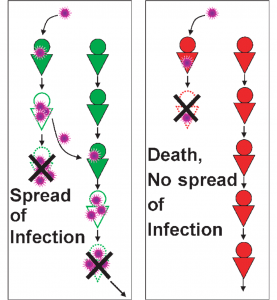Why do we die from infection? Evidence for suicidal defense strategy against infection

Why do we sometimes die so easily from microbial infection? Expression of virulence and death of the infected host should decrease the microbe’s reproductive opportunity. So why do some pathogens maintain such high virulence?

Previous explanations have focused on the pathogen’s strategy. Ichizo Kobayashi at the School of Frontier Sciences focused instead on host strategy (Figure). Usually an infected individual allows multiplication of the pathogen so that its progeny infect other individuals in the population (Figure, left). However, if a member of a host population dies immediately upon infection aborting pathogen reproduction, this death can protect the host population from secondary infections (Figure, right).
The group verified this Suicidal Defense Against Infection hypothesis by developing an experimental infection system involving a large (100 million individuals) host population. E. coli was used as the host and a bacteriophage was used as the pathogen. The results were reproduced in a large-scale simulation based on an evolutionary-game-type mathematical model.
These results indicate the contribution of host strategy to pathogen virulence, which is of important implication in medicine. The present system will be useful in analyzing problems in the epidemiology of infection.
Paper
Masaki Fukuyo, Akira Sasaki, Ichizo Kobayashi,
“Success of a suicidal defense strategy against infection in a structured habitat”,
Scientific Reports (Online Edition): 2012/01/30 (Japan time)
Article link






